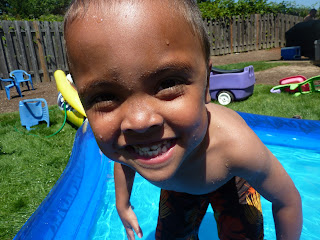My Life Without Oil
by Jason Gist
The title Life Without
Oil conjures up lots of crazy ideas. The first thing that comes to mind
would be automobiles. If you were to Google
it you’d find articles from around the world addressing this topic. Type it in YouTube and you could view endless clips
of some post apocalyptic world struggling to cope with the absence of oil; all these
interpretations are true yet seem so foreign. The problem for me is that the depiction
gets so big that it fails to connect on a personal level.
The message life without oil finally hit me when one night I
watched a documentary titled Aftermath:
World Without Oil. This documentary starts off with skyrocketing gas
prices, black outs, and the loss of some other utilities. Then it hit me; I’ve
gone through this before, only not in the United States. I’ve experience life without
power that for short periods of time which could very well depict Life Without Oil.
My life without oil happened in the Dominican Republic, the
second largest island in the Caribbean that experiences constant power outages
which can last for days. Growing up I spent numerous summers in this island
nation literally in the dark. The first thing that happens when the power goes out
is of course the power. This beautiful island paradise suddenly gets extremely hot,
with no fans or AC’s your forced to take it easy in order to prevent exhaustion.
With no power there’s also no water; since you need electricity to pump the
water. Continuing on the topic of pumps are the semi-operable gas stations.
Attendees will gladly (manually) pump gasoline for triple the price, not that
gas isn’t expensive to begin with. Most homes can still cook since each house
comes equipped with its own kerosene tank. This, of course, is of great use since
most homes must commence cooking all perishable items for fear of rotting in a
fridge that can’t stay cold. Life without power requires plenty of modification.
While life without oil can seem overwhelming we humans do
poses the ability to adapt. Without power came fewer distractions, most notably
from the television. With no television most of us were forced to deal with one
another; settling old differences and forging new friendships. All of a sudden
neighbors were making sure that everyone, especially children and the elderly were
taken care of. Without power there was less noise, no car horns or machines, it
seemed like the sounds of industrialization were replaced by the voices of
people and the instruments they played. Without power people ate less meat,
diets were consumed of mostly grains and vegetables. Life without power was
overwhelmingly different but not all of it was bad.
The duration of these power outages varied according to the political climate of the Dominican Republic. Some would last a few hours while others would go for a week. Making friends with Hugo Chavez definitely helps keep the power outages to a minimum, yet for certain provinces that disapprove with the local establishment power is distributed to them at a bare minimum.
Although once light was restored all was forgotten about life
without power. People literally went from conserving to consumption in the blink
of an eye. Sadly the television was the first thing to come on, the fridge was
restocked with meat, and neighbors retired to their homes never to be seen until
the next power outage. As a nation, more oil is subsidized, freeways get built,
and bigger cars are imported. It seemed as if nothing had changed, yet for a
brief moment I knew what life was like without oil.


No comments:
Post a Comment